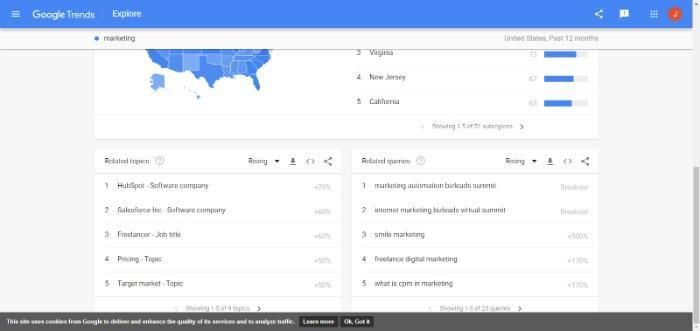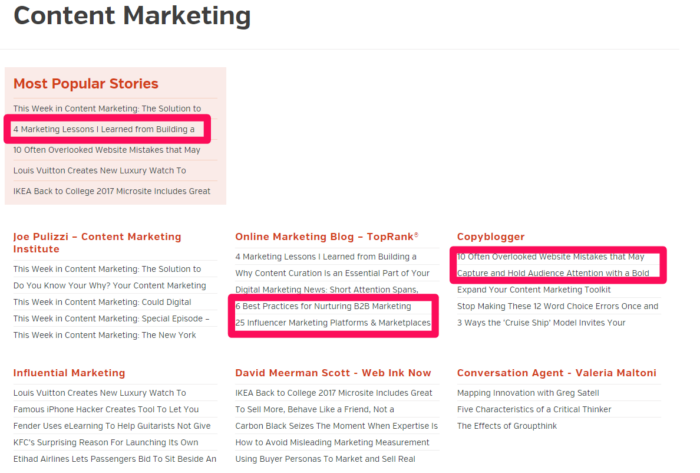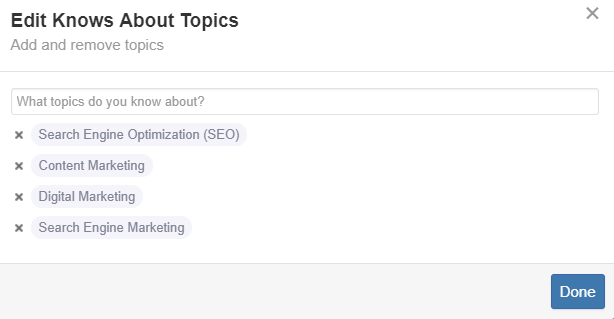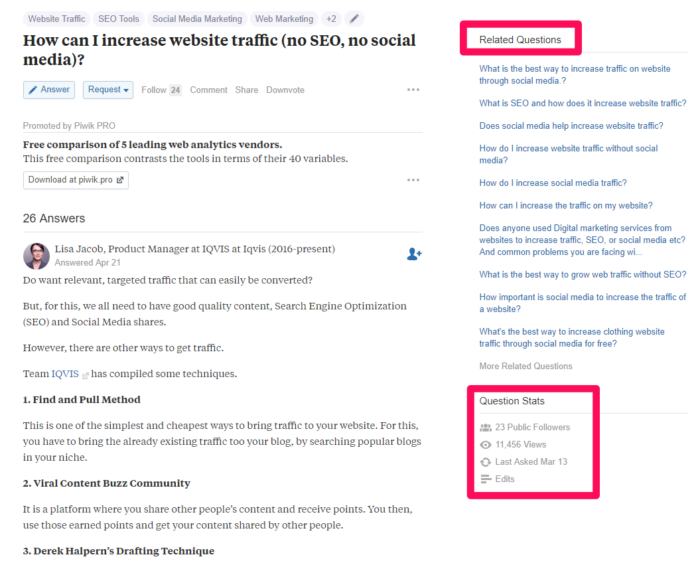
Are you a blogger? Then you’re probably familiar with blank page syndrome. As bloggers, everyone has those moments when the ideas just aren’t there or the words won’t flow.
A 2022 survey from Orbit Media found bloggers who publish bloggers 2-6 posts per week are 50 percent more likely to achieve their goals. However, what if you’re struggling with how to come up with blog topics?
I’m here to help you out.
I’ve got a list of 25 sources that are bound to fire up your imagination. By the time you’ve finished reading this guide, you’ll have so many ideas, your only dilemma will be picking which post to run with.
Ready? Then let’s start by detailing a few ways to store your blog ideas.
Jot Down Your Topic Ideas in a File
Want fast access to blog ideas? Then jot them down, so you’ve got a list of topics ready and waiting for you. You can store your files online; so whenever you’re stuck for ideas, you know where to find them. You may need them a week from now or a year from now, but all the ideas will be there.
Word Doc, Google Doc, or Notes App
There’s no shortage of options for storing your notes on your computer these days. If you’ve got Microsoft Office, you could use the more conventional approach and keep them in a Word document.
You can store your documents on your computer or upload them to OneDrive for access on any of your registered devices.
Evernote, Onenote, Asana, Notion, and Apple Notes are just some apps available for saving ideas ‘on the go’ while searching online.
Now you have somewhere to store your titles, let’s get into the list. Here are 25 ideas on how to come up with blog topics.
Search Popular Blog Sites for Inspiration
Where do you go when you need inspiration? Fortunately, you don’t need to look far. There are plenty of places online to help you out with ideas. Here are two to get you started.
1. Neil Patel’s Blog
You’re already here, so why not start your search? I’ve got one of the largest digital marketing sites online, packed full of fresh ideas. My blog covers every area of online marketing and content in various formats.
One of the essential things about blogging is mixing things up, so I publish a variety of content types, including:
- Reviews
- Tutorials
- Data-driven posts
- Deep-dives
- Video content
- Guest posts
I cover everything from optimizing your e-commerce store to getting started with social media, so there is something for everyone. Whether you are a digital marketer or not, my blog shows how many content topics and styles can be spun out of one area.
2. Marie Forleo’s Blog
Just who is Marie Forleo? She’s an online entrepreneur with a vast audience. Among other things, she offers online training programs, writes a popular blog, and has a global audience. Forleo is also a New York Times best-selling author.
In summing up her business, Forleo says she helps ‘people like you dream big and back it up with meaningful action to create results’.
You can find titles from various categories on the blog, including productivity and personal growth. Additionally, there are interview pieces with authority figures, including Tim Ferris.
Give the blog a look and see if anything sparks your imagination while you learn from a successful entrepreneur at the top of her game.
See What’s Trending
What’s hot and what’s not? You’ve only got to look online to find out what’s grabbing people’s attention or what they want to learn more about. I’ve detailed some resources for you below.
3. Google Trends
Google Trends is a great way to discover what’s creating a buzz.
Head over to trends.google.com and type in a topic you’re curious about or search currently trending searches.
I used the term ‘marketing’ and got this back:

As you can see, there are some trends that you could use as a starting point, like ‘what is CPM in marketing.’
When you type in a keyword, you can also view results by:
- Interest over time
- Country
- Sub-region
- Category
In addition to typing in your own topics, you can also look at what’s trending. Just scroll to the bottom of the main page to find out recently trending topics and what’s new.
You can also use keyword research tools and plugin “trends” to see what topics are related to your industry. If you choose to do this, think about how the content plays into your strategy on evergreen content.
4. AllTop
AllTop is an aggregator of new posts.
Basically, it lets you know what’s happening online by helping you follow specific terms, topics, or categories; whether your interest is fashion, entertainment, sports, or tech, just click on a heading, and AllTop takes you to a list of articles.
Each category has a drop-down menu so you can dive into a sub-niche. For example, say you go to tech; you can choose from cryptocurrency, Apple, e-commerce, etc. Cool, huh?
AllTop lists quality resources, including TechCrunch, Mashable, and Reuters.
Here’s a tiny fraction of the results I get when searching for “content marketing.”

Next, on to one of the world’s most popular social media sites.
5. Twitter
There’s a super-simple way to find out what people are getting excited about: you head over to Twitter and see what’s trending by looking at the hashtags.
For an overall idea of people’s perspectives, click on any trending topics and read some responses.
If you want more detailed information over time, check out Trends 24. Just use the arrow keys to scroll along and see what’s been trending over the past 24 hours.
Alternatively, to view trends by state, go to the bottom of the page and click on your area of interest.
6. Instagram
Just like Twitter, Instagram has a ‘trending’ feature you can use to see what’s attracting people’s attention.
The quickest way is to go to Instagram’s What’s Trending page, but you’ve got other options, too.
Go to the main page and click on ‘explore,’ and get a list of images and phrases. For example, ‘backyard camping,’ ‘healthy recipes,’ and ‘sourdough starter’ were all hot when I looked.
For more detailed info, you could also download Instagram’s trends report, which looks at what matters to Generation Z, such as social justice, AI fashion and beauty, and global music trends.
7. Facebook
Social media giant Facebook says its Trending Topics section aims to allow people to discover helpful and meaningful content.
Trending Topics uses an algorithm to spot subjects that are soaring in popularity. It also uses an RSS website crawl to discover breaking news and events. These RSS feeds connect with a massive range of global media outlets, including CNN, the New York Times, and Reuters.
To see what’s driving the most interest, go to ‘Top Trends’ at the top right-hand corner of the news feed.
8. TikTok
What’s got everyone talking on TikTok? You can find out by visiting TikTok search, which lists the top trending videos.
However, if you look to the right of the page, there are other ways to get ideas, like searching by:
- Sounds
- Hashtags
- Discover more topics
- Suggested accounts
That’s the trends covered. Now let’s look at some more blog ideas.
Industry News
If you’re really niching down, there are few better resources than industry news sites. Although news blog posts might not be the greatest for SEO, they generate a loyal audience that hangs on your every word and could indirectly boost your position in the SERPs.
What is the best thing about covering industry news? You can write about trending topics your audience is likely interested in. With news, you can begin by sharing the facts, blend in your thoughts and opinions, and reach out for expert comments.
Here are two sites to get you started.
9. Geekwire

If your blog covers the tech and business beat, then Geekwire is most definitely for you.
Click on the drop-down menu at the top of the page to look at the comprehensive range of categories covered, including Amazon, Microsoft, and the sustainability space.
Another way to find content is through the GeekWire Startup List. There are a ton of companies listed there; scroll through it, and if a company interests you, perhaps approach them for an interview piece.
Additionally, you could sign up for the newsletter for tech news straight to your inbox.
10. Retail Dive
I expect you can guess what this site is about. If it’s retail news and trends you want, then Retail Dive delivers it in detail.
View the home page and look to the right for:
- top stories in retail
- library resources
- links to retail stories from top news sources
- company announcements
- events/intel
The left-hand columns offer opinions along with the latest news, and you can sign up for the newsletter for regular updates, too.
Alternatively, follow organizations, conferences, and research publications related to your field so you can be among the first to report on breaking industry news.
Finally, for continuous industry updates, you can set Google alerts for search terms related to your industry and quickly produce content that reports on events in your field.
Ask Your Audience
Are you looking for blog ideas? Why not ask your audience? Whatever niche you’re in, your customers ask questions, research, and look for reviews. You can tailor blog posts to answer these common concerns and demonstrate your expertise.
Below are a couple of resources to help you out.
11. Quora
What is your audience struggling with? What are the common issues your prospective readers keep having? Sites like Quora make this easy to discover.
Within just a few seconds of searching, you can find many interesting questions about wide-ranging subjects that you can use to fuel new content creation.
Start by signing up and then filling out your profile’s “Knows About” section with topics that you’re interested in, like this:

Once you’ve organized your profile, you’ll get updated when new questions pop up from other Quora members related to your topics.
Then, you can check out which questions have the most views and people following. This will instantly tell you which ones to start with first (by popularity).
On top of this, clicking on a question provides you with a list of related questions people are asking (and you can view the “Question Stats” in the bottom right-hand corner).

12. Reddit
Reddit is one of the most popular websites, and just like Quora, it’s a treasure trove of blog post ideas. However, with such a rich source of content, what’s the best way to start generating topics?
Well, you can begin by checking out the subreddits in your niche. For instance, if you’re in the digital marketing niche, there are the following:
For more ideas, 99 Signals has a full list of marketing subreddits.
When you find a suitable subreddit, pay attention to the types of questions users are asking. These highlight the questions on users’ minds and allow you to create blog posts to answer them.
According to the stats, many of the top posts in subreddits start with questions, like:
- What is the
- How do I
- Best way to
- What is your
These are all great ways to develop ideas for your specific niche.
Analyze FAQs and Reviews
If you click through any of the resources I’ve shared so far, your mind should already be overflowing with ideas. However, I’ve still got plenty more for you! Let’s look at using review sites and FAQs to find blog ideas.
Nine out of ten customers say they read reviews before making purchases. Capitalize on this by creating blog posts that review popular products and services related to your industry.
If you head over to Google right now and type in ‘best phone,’ you get plenty of reviews in various formats.
These posts comprehensively summarize the various deals/phones/sim-only offers. If you want to do something similar, your aim is to create an even better review. That means:
- providing more valuable content than the top-ranking posts
- having a better on-page experience than the top posts
- ensuring your post has stronger SEO than the top posts
You’d potentially outrank these sites if you wrote a more comprehensive article about the best smartphone—and you’d generate traffic to your website.
Start by looking at the current top-ranking blogs. Note things like:
- how long they are
- what headings they use
- how many options they compare
Aim to make your post longer and more informative by covering more platforms, adding videos, and even interviewing a few experts.
Still wondering how to come up with blog ideas? Why not draw inspiration from the FAQs and review sites below?
13. Glassdoor
Glassdoor aims to help people find great jobs at companies they’ll enjoy working for. In addition, users can get reviews about companies from employees along with salary insights.
For anyone running a blog around employment, human resources, or the workplace environment, Glassdoor is an excellent source of ideas.
Employee reviews help you discover common workplace issues and concerns. For example, some of the topics I noticed in reviews were:
- Long working hours
- Problems finding resources for processes and projects
- Changing workplace culture
Any of these could be a starting place for a blog post in the employment niche.
14. WhatsApp’s FAQ Page
You might think the WhatsApp FAQ page isn’t the most obvious source of blog ideas, but it’s packed full of articles.
The articles are there to help you get the most out of the WhatsApp platform. For example:

- How to make a video call
- How to restore your chat history
- How to stay safe on WhatsApp
If you’ve got a product or service with a load of features, or that has a bit of a learning curve, you can do the same.
Write blog articles around the features and provide tutorials so users can get answers without having to look somewhere else.
Use Keyword Research Tools to Identify Content Gaps
Keyword research tools are invaluable for finding your niche’s content gaps. With the right tool, you can quickly uncover potential topics to write about and target timely search queries. Below are some sources we’d recommend.
15. Answer The Public
Answer the Public takes basic keyword ideas and returns dozens (if not hundreds) of results based on what real people are already looking for in your location.
This is so powerful for a marketer because it hints at the user intent behind the search.
In other words, it gives you a snapshot of someone’s motivations or emotions. I searched for content marketing, and this is what I got:

Results include:
- What’s content marketing
- How content marketing helps business
- Why content marketing is important for B2B businesses
- How content marketing helps
You could write a blog post about every one of those ideas!
Honestly, you could stop right here and probably have enough blog post ideas for the rest of the month just from Answer the Public. However, let’s keep going to show you a few more techniques.
16. Ubersuggest
Ubersuggest is a keyword research tool that helps you generate related topics and vet them for potential. We have a free Chrome extension, too.
Let’s use ‘Instagram marketing’ example to show you how this works.

First, you can use the “Keyword Ideas” tab to spot relevant long-tail phrases quickly. Then, you can either work these into your original idea or even spin them off into their own articles, too.
Additionally, Ubersuggest allows you to find:
- Keyword ideas and visualization
- Similar websites
- Content ideas
- Keywords by traffic
Another feature you’ll find useful is the competitor analysis (CA) tool which allows you to see what your rivals are doing. Using CA, you can find common keywords, view traffic over time, and spot keyword gaps.
Alternatively, you can try a different take on the same idea, like a ‘beginners guide’ or ‘step-by-step guide’.
17. HubSpot’s Blog Topic Generator
Do you need more ideas right now?
Then let me introduce you to HubSpot’s Blog Topic Generator. It promises to ‘take your topic game to the next level’ by allowing you to:
- Create a blog strategy
- Plan content themes
- Come up with clickable headlines
You can generate up to 12 months of content ideas in seconds if you sign up; if you’ve been looking for help developing blog topics, this tool is perfect.

However, if you test it out a few times, you’ll find the titles are often generic, so you’ll need some creative input of your own.
Collaborate With Other Authors and Creative Writers
Sometimes, two minds are better than one. When you collaborate with others, it gives you a chance to bounce ideas off one another. Let’s look at some ideas.
18. Interview With Neil Patel on the Groove Blog
Expert interviews enhance your blog and build authority. The interviewee is also likely to share the link on their social media, meaning more backlinks.
Here’s an interview I did with Groove HQ that resulted in 1917 shares for their website.
When using this technique, find an expert in your industry that people know, reach out to them, and see if they’ll answer some of your questions. To find an expert:
- search LinkedIn
- look at the membership of professional organizations in your field
- look at authors of popular studies or articles in your field
- join or follow social media groups/accounts dedicated to your field and find the authority figures or ask for referrals
Once you have everything together, you can compile it into a blog post that provides value and insight for your readers.
Use Social Media Engagement Tools
You can’t underestimate the power of social media engagement, as it can do a lot to show what content is getting interest and reactions on those platforms. So next, here’s one that has proven invaluable for marketers and bloggers.
19. Buzzsumo
So far, we’ve been focusing primarily on evergreen blog post topics.
However, that leaves a huge gap for an emerging category of new keywords that won’t appear under any of these blog post topic tools. Of course, I’m talking about BuzzSumo.
The site focuses on the most popular trending topics over the past few hours, days, weeks, and months. Let’s start with the basics, though.
When you go to the homepage, enter your keyword or domain and click on ‘Find Content.’
For example, let’s type in NeilPatel.com to see what it shows:

See? It gives you a load of valuable data.
You can also filter by:
- Date
- Sharing metric
- Topics
- Total shares on different social media channels
Many of the results that pop up are either ‘step-by-step guides,’ ‘beginner’s guides, or ‘complete guides.’ By looking at what your competitors are doing, you can reverse-engineer their offerings and find what works for them.
Write Content You’re Most Passionate About
Create content that you’re passionate about, and you’ll never get bored. Hopefully, your audience won’t either, and you can keep them engaged with regular content about topics that matter to you (and your readers).
20. Social Justice Topics
If you believe in something strongly enough, why don’t you take a stand on your blog?
You could write about the latest social justice trends in women’s rights, LGBTQ+, or racial injustice. Any subject that is close to your heart.
An excellent example is Campus Pride. It’s a popular blog/organization that focuses on the acceptance of the LGBTQ+ community on college campuses. It covers topics centering around mental health, campus safety, and career development.
However, remember to take an authentic stance if you’re incorporating social justice topics into your blog.
Think about what issues matter to you and what causes make sense to post about.
For example, Patagonia is an outdoor apparel and equipment retailer. So it makes sense that they align themselves with environmental issues, like sustainability and conservation.
21. Sports and Entertainment
OK. So, you might not be the next Bleacher Report or Buzzfeed. However, the potential in covering these two areas is significant.
As a sports blogger, you could voice strong opinions about team rivalries or performances, player trades, and other hot topics within their sport of choice.
You could also niche it down to a specific sport or area.
Likewise, entertainment bloggers can provide readers with an inside look into Hollywood gossip or music industry trends.
Don’t have inside info? That doesn’t matter! Offer up-to-date reviews on the latest movies, TV shows, video games, and books, or voice your opinions.
22. Opinion Pieces
Are you the type of person that has an opinion about everything? Or you are passionate about one subject area, like the environment?
Opinion pieces allow people to express their viewpoints on a particular topic, be it political, social, or even cultural.
Opinion pieces can range from short and succinct articles to longer and more detailed ones. In either case, opinion piece blogging provides an avenue for individuals to share their views and engage in meaningful conversations with others.
Need some inspiration? Think Huffington Post or Washington Post.
Create Ultimate Guide Lists
A great way to engage readers, capture their attention, and make sure that your content stands out is by using a list format.
Lists are one of the most simple ideas for a blog post, and when you create an ultimate guide list post, you can break down complex topics into manageable chunks of information.
In addition, this format lets you provide users with the most relevant information they need without overwhelming them with unnecessary details. From breaking down subjects step-by-step to providing helpful examples, lists are a great way to curate content concisely and in an easy-to-read format.
Below is an excellent example from HubSpot.
23. The Ultimate Guide to Email Marketing by HubSpot

The CRM platform HubSpot is well-known for its comprehensive guides and doesn’t disappoint visitors with its ultimate email marketing guide.
HubSpot covers everything from stats to creating your strategy and also includes the following:
- Building your list
- Developing a schedule
- Creating lead magnets
- Adding opt-in forms
Throughout the post, Hubspot offers plenty of its own lead magnets, like templates and other downloads.
Speak to Your Subject Matter Expertise
By speaking to your area of expertise through blogging, you have the potential to build relationships with other professionals, establish yourself as an authority in your field, and even expand opportunities for employment or entrepreneurial ventures.
Here are some examples of blogs that do a fantastic job of demonstrating expertise.
24. Healthline
Whether you’re looking for advice on dieting or learning more about the latest medical treatments, Healthline has got you covered.
The site provides comprehensive content in multiple formats including articles, videos, infographics, and slideshows. Its variety of formats gives readers a choice of how they’d like to consume the content and keeps topics from getting stale.
All of its content is written by experienced healthcare professionals who are dedicated to providing accurate and trustworthy information about all things related to health and wellness.
25. Ahrefs

The Ahrefs blog has something for everyone.
You can find guides on keyword research and link-building techniques and advice on optimizing your site structure and content. Ahrefs blog covers topics like:
- How to Start an E-commerce business
- International Link Building: 9 Aspects that might surprise you
- SEO Pricing: How much does SEO cost in 2023?
Plus, you can dig into the blog archives for categorized posts like SEO, link building, and technical SEO.
Finally, while you’re there, check the data and studies links. There are tons of ideas for a blog post there! Think about concepts like the top 100 most visited websites and how long it takes to rank on Google.
FAQs
What should I blog about in 2023?
It depends on where your passions and expertise lie, and who your customers are. It’s important that you pick relevant topics for your audience and that you speak with authenticity and authority on your chosen topic.
You can use any types of content that you find interesting, informative, or useful and use them as inspiration to start brainstorming.
Should I use tools to come up with blog ideas?
Yes, you need keyword research tools like Ubersuggest to help you develop topics with search volume. If you’re struggling to get your blog off the ground, we can help.
How many blog ideas should I have?
I recommend having at least a month’s worth of blog ideas planned out before starting. This ensures you have a backlog of ideas if you fall behind or get busy on other projects.
Conclusion
This huge list of blog ideas should help you figure out what you can cover. Take some of the suggestions and plan out your content calendar. Be sure to use various options to keep things fresh and interesting for your readers.
Remember, knowing how to come up with blog topics is hard, but always put your interests first. If you’re blogging about something you love, it’ll be much easier to write consistently.
Provide value to your readers, conduct proper keyword research, and always follow the basic principles of SEO.
Out of all the blog post inspirations in this guide, which one is your favorite? Why?

See How My Agency Can Drive More Traffic to Your Website
- SEO - unlock more SEO traffic. See real results.
- Content Marketing - our team creates epic content that will get shared, get links, and attract traffic.
- Paid Media - effective paid strategies with clear ROI.
Are You Using Google Ads? Try Our FREE Ads Grader!
Stop wasting money and unlock the hidden potential of your advertising.
- Discover the power of intentional advertising.
- Reach your ideal target audience.
- Maximize ad spend efficiency.

